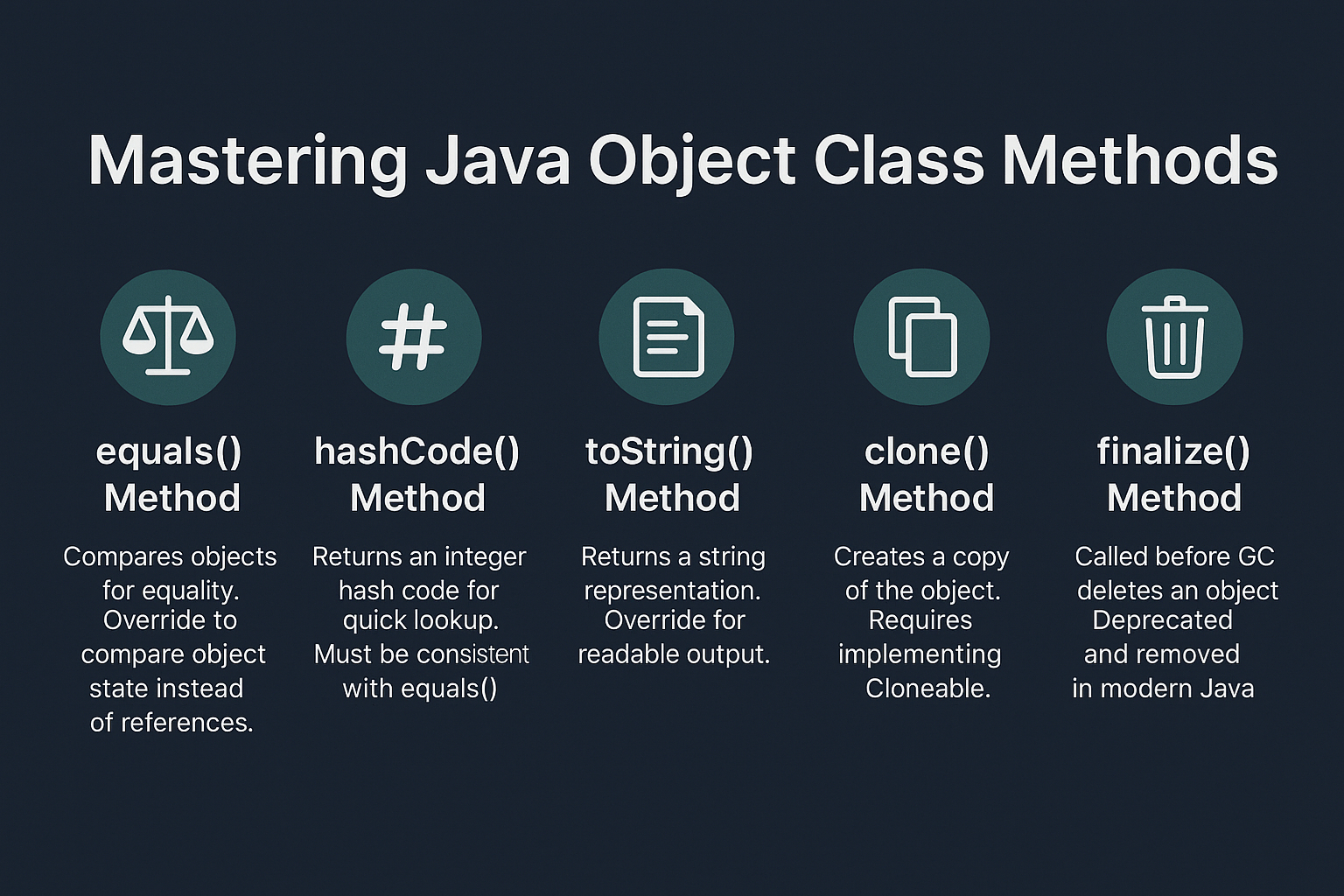The Object class is the root of Java's class hierarchy, and its methods form the foundation for all Java objects. Understanding these methods is critical for writing robust, efficient, and maintainable code.
📌 What is the Object Class?
- Definition: The
Objectclass injava.langis the ultimate superclass for every Java class. - Why it matters: Provides default implementations for common methods like equality checks, string representation, cloning, and cleanup.
- When to use: Override these methods when you need custom behavior in collections, debugging, or copying objects.
🔹 equals() Method
✅ Concept:
- Compares objects for equality.
- Default: Compares memory references (
==). - Override to compare object state instead of references.
💻 Example:
class Person {
String name;
Person(String name) { this.name = name; }
@Override
public boolean equals(Object obj) {
if (this == obj) return true;
if (!(obj instanceof Person)) return false;
Person p = (Person) obj;
return name.equals(p.name);
}
}
🔹 hashCode() Method
✅ Concept:
- Returns an integer hash code.
- Used in
HashMap,HashSetfor quick lookup. - Must be consistent with
equals().
💻 Example:
@Override
public int hashCode() {
return name.hashCode();
}
🔹 toString() Method
✅ Concept:
- Returns a string representation.
- Default:
ClassName@HexHashCode. - Override for readable output.
💻 Example:
@Override
public String toString() {
return "Person{name='" + name + "'}";
}
🔹 clone() Method
✅ Concept:
- Creates a copy of the object.
- Requires implementing
Cloneable. - Default is shallow copy.
💻 Example:
class Person implements Cloneable {
String name;
Person(String name) { this.name = name; }
@Override
protected Object clone() throws CloneNotSupportedException {
return super.clone();
}
}
🔹 finalize() Method
✅ Concept:
- Called before GC deletes an object.
- Deprecated in Java 9, removed in Java 18.
- Avoid; use
AutoCloseableinstead.
💻 Example:
@Override
protected void finalize() throws Throwable {
System.out.println("Finalize called");
}
🔹 Real-World Analogy
- equals(): Checking if two keys open the same lock.
- hashCode(): Key's unique teeth pattern for quick matching.
- toString(): Label on the key.
- clone(): Making a duplicate key.
- finalize(): Key being thrown away when no longer used.
📊 Comparison Table
| Method | Default Behavior | When to Override |
|---|---|---|
| equals() | Reference comparison | Compare object state |
| hashCode() | Based on memory address | Work with hash collections |
| toString() | Class@hashcode | Debugging, logging |
| clone() | Shallow copy | Create object copies |
| finalize() | Cleanup before GC | Avoid, use alternative APIs |
🚫 Common Mistakes
- ❌ Overriding
equals()withouthashCode(). - ❌ Using mutable fields in
hashCode(). - ❌ Relying on
finalize()for resource cleanup.
📈 Performance and Memory
hashCode()heavily impacts HashMap performance.clone()can be expensive for deep copies.- Overriding
toString()has negligible performance impact.
🔧 Best Practices
- Override
equals()andhashCode()together. - Make
toString()descriptive and concise. - Prefer copy constructors over
clone()for complex objects. - Avoid
finalize(), usetry-with-resources.
📌 Java Version Relevance
| Java Version | Change |
|---|---|
| Java 1.0 | Object class introduced |
| Java 9 | finalize() deprecated |
| Java 18 | finalize() removed |
✅ Conclusion & Key Takeaways
- Object class methods define default behavior for all Java objects.
- Override equals/hashCode for custom equality, toString for readable output.
- Use cloning carefully, avoid finalize in modern Java.
❓ FAQ
Q1: Can we override equals() without overriding hashCode()?
A: No, it breaks the general contract in collections.
Q2: Is clone() thread-safe?
A: No, synchronization must be handled manually.
Q3: Can we call finalize() manually?
A: Yes, but it's discouraged and unreliable.
Q4: Are hashCode() values unique?
A: Not guaranteed, collisions are allowed.
Q5: Can equals() be static?
A: No, it compares instances.
Q6: Does overriding toString() affect GC?
A: No, it’s only for string representation.
Q7: Is clone() faster than serialization?
A: Shallow clone is faster; deep clone depends.
Q8: Can finalize() revive an object?
A: Yes, but it's an anti-pattern.
Q9: Are all primitive wrappers overriding equals()?
A: Yes, for value comparison.
Q10: Is hashCode() used in TreeMap?
A: No, TreeMap uses compareTo/comparator.
